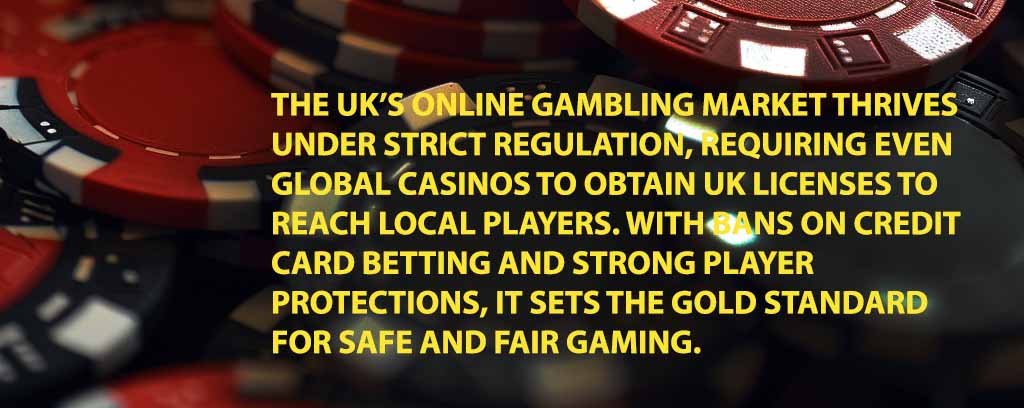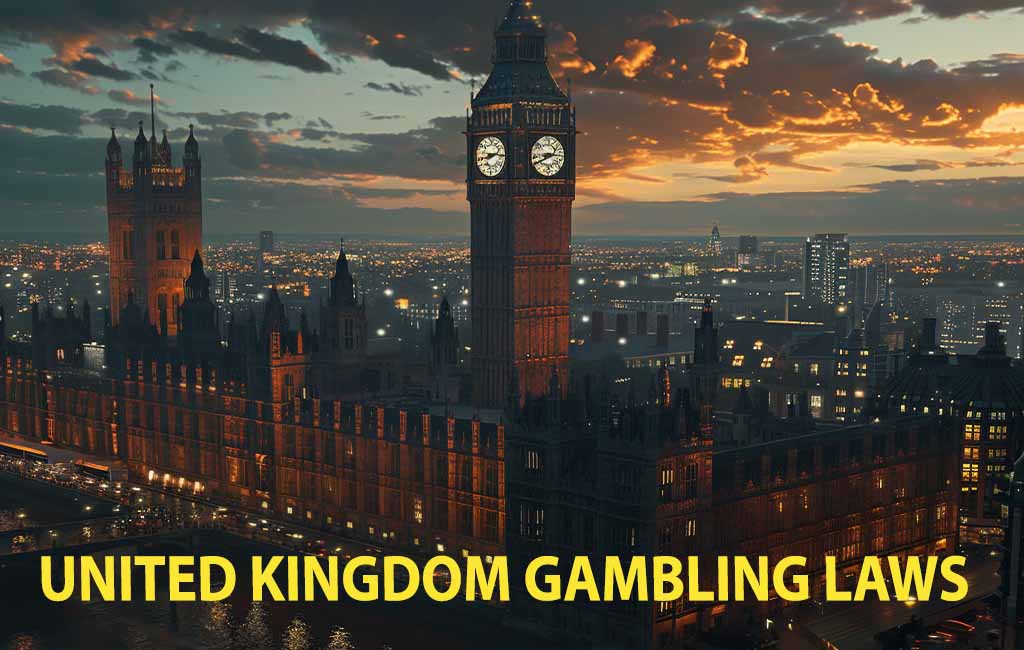The gambling regulation in the United Kingdom are quite strict compared to other countries. They are developed to ensure a fair, transparent, and safe environment for all players. Governed primarily by the UK Gambling Commission (UKGC), these regulations cover a wide array of gambling activities, including online and offline casinos, sports betting, bingo, and lotteries. Established under the Gambling Act 2005, the UKGC’s mandate is to oversee the integrity of the gambling industry, protect vulnerable groups, and prevent gambling-related crimes. As the gambling landscape evolves with technological advancements, the UK’s regulatory framework continues to adapt, aiming to balance enabling economic growth and safeguarding public welfare
A Highlight of the Gambling Regulations in UK
- Gambling is legal and regulated in the UK.
- The UK Gambling Commission is the main body responsible for issuing licenses and overseeing the industry.
- The UK Gambling Act (GA) 2005 is the foundation of gambling regulation.
- Gambling activities require a license from the UK Gambling Commission.
- The Advertising Standards Authority (ASA) ensures that ads across UK media adhere to the advertising rules known as the Advertising Codes.
- Anyone under 18 is prohibited from entering licensed gambling premises.
An Overview of Gambling in the UK
The United Kingdom is Europe’s second-largest gambling nation, with gamblers spending close to $19 billion on bets each year. This means industry regulations must be continuously updated to protect players and prevent criminal activity.
The gambling sector has also evolved drastically over the years, and it has become necessary to develop comprehensive laws to keep up with these changes. They aim to ensure fairness, responsible conduct, and transparency within the industry.
For gamers, this article will examine the main aspects of these laws and gambling regulations in the UK to ensure you are fully informed about the relevant dos and don’ts.
Gambling Regulations in United Kingdom: What are The UK Laws on Gambling?
The United Kingdom has a robust legal framework governing gambling, primarily outlined in the Gambling Act 2005, which serves as the cornerstone of UK gambling law. Here are the key components:
UK Gambling Act 2005
The Gambling Act (GA) 2005, which reshaped the entire gaming landscape, is at the center of all UK gambling regulations. This innovative piece of legislation was enacted to replace the Betting and Gaming Act of 1960. It defines gambling as ‘ betting, gaming or participating in a lottery.’
It covers all areas of the gambling industry, from the burgeoning UK online gambling scene to more traditional forms of entertainment like land-based casinos. The Act outlines the six major types of gambling: bingo games, casinos, lotteries, arcades, betting, and gaming machines.
Some key elements of the UK Gambling Act 2005 include;
- Licensing: The Act establishes a licensing system for all gambling activities, both online and offline, such as lotteries, online gambling websites, betting shops and casinos, and bingo halls and arcades. This ensures operators meet specific standards for fairness, safety, and responsible gambling practices before offering services.
- Regulation: The Gambling Commission is the central body established by the Act. It’s responsible for issuing licenses, enforcing regulations, and investigating breaches. They also set codes of practice that gambling operators must follow.
- Objectives: The Act outlines three main objectives for gambling regulation:
- Protecting children and vulnerable people: This includes age restrictions, responsible marketing practices, and measures to help people with gambling problems.
- Preventing crime and disorder: The Act aims to keep gambling free from criminal activity like money laundering and fraud.
- Ensuring fairness and transparency: This involves ensuring games are fair, odds are clear, and customers are treated honestly.
- Advertising and promotion: The UK Gambling Act 2005 restricts gambling advertising, particularly to protect children and vulnerable people. Advertisements must be socially responsible and not misleading. They should also comply with the codes of practice issued by the UKGC and the Advertising Standards Authority (ASA).
- Offences and Protections. This gambling regulations in UK addresses various offenses related to gambling, such as providing facilities, protecting children and young persons, and employment-related offenses.
Taking effect on 22 July 2025, the Gambling Act 2005 was supplemented to modernize and harmonize regulation, extend entitlements, and uphold consumer protections.
The new regulations are related to gambling reforms for land-based casinos in the UK.
- Easing restrictions on the number of gaming machines allowed in casinos from 20 to up to 80, depending on venue size.
- Allowing real event (sports) betting via self-service betting terminals inside casinos.
The UK Gambling Commission (UKGC)
The UK Gambling Act 2005 established the Gambling Commission, which oversees all gambling activities and ensures that providers meet the required standards of fairness, integrity, and social responsibility.
The Commission can issue fines or even revoke licenses in case of non-compliance. A good example is the William Hill Group, fined over $23 million – one of the largest fines in history – for not applying safe gambling practices or adequate anti-money laundering measures.
The UK Gambling Commission is also tasked with issuing licenses after a thorough vetting process. By monitoring gambling activities, it investigates breaches of the set regulations. Their main goals are to maintain the industry’s reputation, combat criminal activity, and ensure gamers and the general public are safe.
The roles of the UK Gambling Commission in detail include;
- Protecting vulnerable groups: Safeguarding children and vulnerable people from the risks of gambling. They implement age restrictions, work with gambling operators on responsible marketing practices, and promote resources for those struggling with problem gambling.
- Combating Crime: The UK Gambling Commission works to keep gambling free from criminal activity. This involves measures to prevent money laundering, fraud, and other illegal activities that might infiltrate the industry.
- Advertising and Marketing Oversight: The UK Gambling Commission works with the Advertising Standards Authority (ASA) to ensure that gambling advertisements are socially responsible and do not target vulnerable individuals, including minors.
- Fairness and Transparency: The UKGC ensures that gambling products are fair and that operators conduct their business transparently. This includes oversight of game fairness and the random number generators used in online gambling.
If you intend to seek a legal gambling license from the UK Gambling Commission, you will be evaluated based on:
- Your identity and the identity of key people related to your venture,
- Your level of trustworthiness, honesty, and integrity,
- Financial statements as proof of business continuity and stability,
- Relevant expertise, previous experience, qualifications, and history,
- Your criminal record, if any,
- Evidence of responsible behaviour and business practices.
You can find a full list of these requirements here.
The Commission launched the ‘Tell Us Something in Confidence’ program in December 2023 so that the public can report suspicious or criminal activity in the gambling sector.
The UK Gambling Commission also encourages you to report activities such as:
- Unlicensed gambling establishments,
- Underage gambling,
- Money laundering,
- Match-fixing.
This anonymous service lets you upload documents and photographs regarding your claims.
Gambling (Licensing and Advertising) Act 2014
While the UK Gambling Act 2005 covered gambling broadly, the 2014 Act specifically addresses the growing online gambling market. It was introduced to ensure that all gambling operators, regardless of their location, adhere to the same high standards set by UK regulations when offering services to UK consumers.
The Act requires all remote gambling operators, regardless of location, to obtain a license from the UK Gambling Commission to target customers in Great Britain. This ensures that online gambling services meet the same high standards as land-based gambling operations.
The Gambling Act 2014 also restricts the advertising of gambling services to UK consumers. Only operators licensed by the UKGC are permitted to advertise their services in the UK. This gambling regulation in the UK applies to all forms of advertising, including television, radio, online, and print media.
The Act introduced a point of consumption tax (POCT), which requires operators to pay tax on gambling profits generated from UK customers. This change shifts the tax burden from where the operator is based to where the consumer is located, ensuring that the UK government receives tax revenue from all gambling activities involving UK residents.
In simpler terms, the 2014 Act plugged a gap in the previous legislation by specifically regulating remote gambling and ensuring domestic and overseas online operators follow the same rules for consumer protection and responsible advertising within the UK market.
Anti-Money Laundering (AML)
The UK Gambling Act 2005 emphasizes anti-money laundering measures. In addition, the Gambling Commission clamps down extremely harshly on people who follow its guidelines. Their hard stance is clear when you consider that fines of over $43 billion were issued in 2020 alone, as well as the revocation of several licenses.
The Proceeds of Crime Act 2002 requires gambling operators to have adequate checks and measures to prevent money laundering and terrorist financing in their establishments.
Why do Casinos Need to Conduct AML
As a gambler, you must verify your identity before being allowed to gamble. This might seem tedious and a waste of your time, but there are three essential reasons why gambling companies do this.
- To confirm your identity for AML purposes.
- To check whether you are old enough to gamble.
- They check if you’re self-excluded from gambling because the casino must take reasonable steps to stop you from gambling.
DEFINITION. Self-exclusion is a program offered by gambling establishments or regulatory bodies that allows individuals to voluntarily ban themselves from gambling activities for a predetermined period. It’s a tool for people who recognize they have a gambling problem and want to take steps to control it.
Money laundering in the UK can be divided into four major forms, which I have outlined below.
- Using criminal funds to gamble for entertainment.
- Buying digital currencies with illegal funds that are then used to gamble online and withdrawing winnings as clean money.
- Gambling on low-risk games with illegal funds and turning them into legitimate money.
- Setting up shell gaming companies or businesses associated with them to launder money
Operators must conduct customer due diligence (CDD) to add another layer of security. This publication provides more details about CDD.
What is the State of Online Gambling in the United Kingdom?
Online gambling in the UK has seen exponential growth, and its popularity is one of the main reasons the Gambling Act was enacted. One of the British gambling laws that governs this type of gambling is the Remote Gambling and Software Technical Standards (RTS), which provides guidelines for online gaming providers. These include online Bitcoin casinos UK, sports betting sites, poker rooms, bingo, and virtual slots.
UK online gambling regulation addresses critical issues such as:
- protection of players’ funds,
- features of responsible gambling,
- fairness,
- use of random number generators,
- security, and
- data protection.
There is also a strong emphasis on responsible online gambling, and operators must take measures to promote such behavior. They are also obligated to provide resources and support services. Some measures they must implement include imposing maximum deposit limits, self-exclusion features, and reality checks.

In line with the government’s actions to monitor online gambling, providers will face ongoing compliance checks to ensure they maintain the highest standards in areas such as security, fairness, consumer protection, and ethical practices.
Like land-based gaming venues, online gambling platforms must apply for a license from the UK Gaming Commission. The Advertising Standards Authority (ASA) is another piece of legislation that applies to online gaming. Adverts need to be transparent, protect vulnerable individuals, not target minors, and meet the ethical standards set by the ASA.
NOTE: Credit card payments are illegal for online gambling according to Gambling (Prohibition on Credit Card Payments) Regulations in 2020. This is to prevent players from betting on borrowed money and reduce the prevalence of excessive gambling.
One final key aspect of the UK Gambling Act 2005 to online gaming is the protection of customer data. Providers of online platforms must comply with laws set out by the Information Commissioner’s Office.
They must:
- Handle data responsibly and transparently,
- safeguard the security of player details, and
- guarantee the privacy of everyone who accesses their platform.
Overall, the state of online gambling in the United Kingdom is characterized by a well-regulated and thriving market, marked by high participation rates and significant economic contributions. The UKGC’s robust regulatory framework ensures consumer protection and market integrity, while ongoing reforms aim to adapt to new challenges and maintain a safe gambling environment.

What are The Gambling Reforms in the UK?
The UK has been actively pursuing gambling reforms to address emerging challenges and ensure a safer gambling environment.
Some reforms include;
- A comprehensive review of the Gambling Act 2005 aims to assess the effectiveness of the existing regulations and consider new measures to protect consumers.
- The UK government is expected to publish a white paper outlining proposed changes to the Gambling Act 2005. This document will provide a roadmap for future legislative and regulatory reforms.
- Operators will be required to conduct affordability checks on customers to assess their ability to sustain gambling losses without experiencing financial harm.
- The UK Gambling Commission banned the use of credit cards for all forms of gambling, except for non-remote lotteries.
- The introduction and expansion of self-exclusion schemes like GamStop allow individuals to block themselves from all UK-licensed online gambling sites.
- The Whistle-to-Whistle Ban, introduced in 2019, prohibits gambling advertisements during live sports broadcasts before 9 p.m. to reduce exposure to minors.
- The White Paper, “High Stakes – Gambling Reform in the Digital Age”, outlined the Government’s strategy to update the Gambling Act of 2005, covering both land-based and online sectors. It includes aligning and rationalizing the machine entitlements across different casino types as well as changing the machine-to-table proportions in land-based gambling facilities. In online casinos, not product expansion, but players’ safety, affordability, and game design standards were the main priorities.
- The July 2025 casino reforms (extra gaming machines and in-venue betting) were the implementation of measures first outlined by the 2023 White Paper and then followed up with secondary legislation from Parliament. The new UK Casino Regulation supplements are loosening gaming machine limits and allowing in-venue betting on sports.
Does the UK Have No Tax on Gambling?
Yes, in the UK, gambling winnings are not taxed. This applies to all forms of gambling, from lotteries and sports betting to casinos and online games. You don’t have to pay any taxes on your winnings, regardless of the amount.
However, it’s important to note that the government collects taxes from gambling operators. This is not a tax on winnings but rather on the profits generated by gambling businesses. Some taxes include betting, lottery, and remote gaming duty. This approach encourages participation in gambling activities while ensuring that the government collects revenue from the industry to support public services and initiatives.
What is the Legal Age to Play at Casino in the UK?
The legal age to gamble at a casino or any licensed gambling venue in the UK is 18. This applies to all forms of gambling within the venue, including slot machines, table games, and card games.
Casinos and other gambling establishments must verify their customers’ age through identification checks. This is to ensure compliance with the law and protect minors from gambling-related harm.
Operators who fail to prevent underage gambling can face significant penalties, including fines and the suspension or revocation of their licenses by the UK Gambling Commission. These measures underscore the importance placed on protecting young people from the potential risks associated with gambling.
The Bottom Line is…
The gambling regulations in the United Kingdom represent a comprehensive and evolving framework designed to balance the interests of operators, consumers, and society. The UK Gambling Commission (UKGC) plays a pivotal role in overseeing the industry, ensuring that gambling activities are conducted fairly, transparently, and safely. In addition, the Gambling Act 2005 has played an essential role in protecting children and vulnerable people from gambling problems. It has also prevented crime and disorder and ensured fairness and transparency.
The guidelines it sets out apply to online gambling and provide clarity. These policies, intending to protect consumer rights and maintain the industry’s economic interests, create a robust regulatory framework. As the industry continues to evolve with technological advancements, the UK remains committed to adapting its regulations to safeguard public welfare and ensure a safe and enjoyable gambling environment for all.
Gambling is addictive. If you want to see help with problem gambling, contact The National Gambling Helpline on 0808 8020 133.
Frequently Asked Questions(FAQs)

